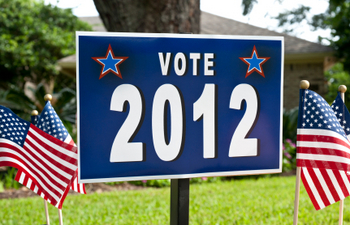
Regulation remains a divisive–and perhaps a decisive–issue in today’s election.
As the presidential election unfolds today, regardless of which candidate wins—be it President Barack Obama or Governor Mitt Romney—one divisive issue is likely to remain at the forefront of American consciousness: the proper role of regulation.
The Regulatory Review, like every other news organization, has focused much attention on the presidential election over the past year – but we have done so with in mind the implications this election holds for the future of the federal government’s regulatory role. We have viewed our task as an important one because—as well demonstrated by the first presidential debate and the subsequent vice presidential debate—regulation figures prominently in policy deliberations over society’s most pressing problems.
President Obama is running for reelection on the basis of his legislative victories that have expanded the federal government’s regulatory authority over major facets of our economy in an effort to advance important policy goals. Over the past four years, he has signed into law two landmark pieces of regulatory legislation, targeting financial markets first and then the nation’s health care system.
These two new regulatory regimes have not lacked their detractors. Recently, as observers note the difficulty of implementing financial reform, some members of Congress have proposed to amend or repeal the Dodd-Frank Wall Street Reform and Consumer Protection Act. Likewise, for a long time private parties and states pursued lawsuits challenging the constitutionality of the Patient Protection and Affordable Care Act, although the litigation ended when the Supreme Court largely upheld the law this summer.
Touting both of these major legislative achievements, President Obama and the Democratic Party have defended the importance of strong regulations and have argued that in a second term the administration will continue to work to make rules “simpler and more flexible” and develop regulation “based on sound science.” Of course, it remains unclear whether an agenda of regulatory flexibility is something that a second-term Obama administration would carry out with fervor – or whether it can even be achieved within the constraints Congress has imposed on regulatory agencies.
From the standpoint of the Republican Party, ever since at least the start of the primary season, its presidential candidates have harshly condemned what they have characterized as the federal government’s unduly oppressive rule books—particularly the regulations that will need to be promulgated to implement the Dodd-Frank Act and the health care reform law. For Republicans, many regulations have come to be known as “job-killing” regulations.
The eventual winner of the Republican primaries, Governor Romney, has criticized a variety of energy, environmental, and other federal regulations in his oft-cited 59-point plan to stimulate economic growth. Earlier this summer, The Regulatory Review featured an extensive set of commentaries on various aspects of Romney’s regulatory plan, including the idea of mandating Congressional approval of significant regulatory actions and his proposal to set a cost-based cap on the cumulative effect of an agency’s regulatory regime. But the actual mechanics of how these proposals would be implemented remain, to date, unspecified.
Whichever candidate wins today’s election, he will need to confront a regulatory system facing a crisis of confidence, where a majority of Americans believe that our regulatory system creates more harm than it does good. As suggested by a recent book by Penn Law Professor Cary Coglianese, some policymakers and scholars have even begun to question whether the U.S. regulatory system has irreparably broken down – and whether the partisan politics bleeding from Congress to the Presidency to regulatory agencies will keep the nation’s political leaders from fixing it.
According to a recent op-ed by President Obama’s former Office of Information and Regulatory Affairs Administrator, Cass Sunstein, the winning candidate “will soon be focusing on leading issues of regulatory reform.” This statement is correct: regulatory reform will be a pressing issue for the incoming president. However, the issues confronting the nation’s regulatory system transcend any single body of the federal government. If one believes that the regulatory system needs repair, then it is a problem for the entire federal government to resolve, starting with the legislative branch.
Mickey Edwards, himself a former member of Congress, has offered a hopeful perspective on what should happen after the election. Members of Congress, he writes, “should…be answering to the large numbers of us who are increasingly demanding bipartisanship and compromise.” Such compromise will need nurturing – and even prompting – by the broader public, of course. But as Rep. Edwards has reminded us, that is the point of our democracy: “The beautiful thing about our governmental system is that, in the end, the power to change it rests with us.”
Sean Moloney is the editor-in-chief of The Regulatory Review at the University of Pennsylvania Law School.



